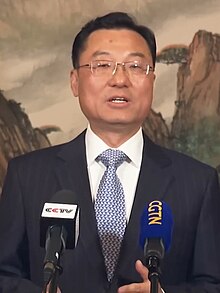At a time when China-U.S. relations feel more like a simmering standoff than a partnership, Chinese Ambassador to the United States Xie Feng is pushing for a game-changing attitude shift. Speaking at the 2024 Gala Dinner for the National Committee on U.S.-China Relations (NCUSCR) in New York, Xie delivered a passionate appeal: “To take the China-U.S. relationship forward, it is important to tackle challenges with greater courage.” He emphasized that the two nations need to “pool their wisdom” and create a future that sidesteps rivalry for a collaborative path—something easier said than done, given recent tensions.
Xie walked his audience through a bit of a history lesson, reminding everyone that when the U.S. and China have worked together, both nations have benefitted. Past cooperation, he stressed, brought “win-win outcomes” and bolstered stability worldwide. “The right thing to do is to explore the right way to get along, featuring mutual respect, peaceful coexistence, and win-win cooperation,” Xie insisted, underscoring that moving beyond the current strained dynamics is not only possible but essential for global progress.
The ambassador didn’t dance around the issue of Taiwan, either—a primary friction point. “Taiwan is an integral part of China,” he stated firmly, urging that for peace to hold in the Taiwan Straits, the U.S. must uphold the one-China principle and adhere to the commitments made in the three joint communiqués between China and the U.S. His message? No gray areas on Taiwan if we want to see regional stability.
It wasn’t all critique; Xie also showed gratitude toward the NCUSCR, crediting the organization for fostering “mutually beneficial cooperation and exchanges” since 1966, when even basic dialogue between the two countries was a struggle. He acknowledged the committee’s role in building people-to-people ties and helping to stabilize relations during rocky times.
But Xie’s speech went deeper, alluding to the untapped potential of a world where China and the U.S. act as partners rather than adversaries. His question, implicitly posed to the room of U.S. policymakers, business leaders, and influencers: Will Washington meet Beijing halfway? Because from Xie’s perspective, it’s high time to choose cooperation over contention. Despite what he described as the “grave challenges” in current relations, he pointed out a dedicated community of advocates who, like him, remain optimistic.
As global attention watches every move in this geopolitical dance, Xie’s words carry a message for both sides: Let’s stop circling each other and start stepping toward a new era, one where diplomacy isn’t just about managing crises but cultivating opportunities. As he put it, if China and the U.S. can break down today’s barriers, they might just pave the way for a future where “greater courage” transforms cautious engagement into genuine progress. The real question is—who will make the first move?












